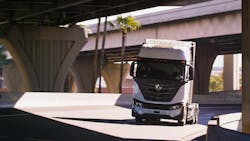Nikola developing low-carbon hydrogen production in Pennsylvania
Nikola Corporation and KeyState Natural Gas Synthesis are working together to create Pennsylvania’s first low-carbon hydrogen production value chain, which includes full integration of commercial carbon capture and storage. The project is intended to represent the transition to lower emissions transportation, chemicals, and manufacturing. The companies are working towards a definitive agreement to expand the hydrogen supply for Nikola’s zero-emissions heavy-duty fuel cell electric vehicles (FCEVs).
“Nikola’s participation in the project will allow us to secure sufficient volumes of hydrogen to underpin and accelerate the adoption of zero-emission trucks by unlocking new customer demand and enabling key investments in downstream hydrogen refueling infrastructure in the Mid-Atlantic region,” said Carey Mendes, Nikola president. “This will be key to our supply strategy and will help develop our refueling network at scale. Additionally, the low carbon, clean hydrogen will allow us to maximize value under the Inflation Reduction Act and future downstream fuel and dispensing incentive programs.”
KeyState plans to supply Nikola with up to 100 metric tons per day of low-carbon hydrogen, which can supply fuel for up to 2,500 Nikola Tre FCEVs and will displace over 51 million gallons diesel fuel per annum consumed, according to Department of Energy data cited in a Nikola press release. Once operational in 2026, the 7,000-acre KeyState site is expected to have the capacity to store the carbon dioxide associated with hydrogen production and will provide strategic reach and access to premium Mid-Atlantic FCEV markets. KeyState will also produce ammonia and urea for industrial and transportation markets, in addition to Nikola’s hydrogen mobility demand.
See also: Zeem to buy 100 Nikola Class 8 electrics
The KeyState project is planned to integrate carbon capture from high-efficiency autothermal reforming with onsite geological carbon sequestration and onsite close-system sourced natural gas feedstock, all while generating zero-carbon electricity. Approximately 99% of carbon from the hydrogen in methane is expected to be returned to deep underground onsite geological storage.
“KeyState has developed a replicable model for low carbon, low-cost hydrogen at large scale production,” said Perry Babb, KeyState Energy CEO. “This project will have multi-county, multi-generation, economic impact and job creation in a formerly booming Pennsylvania coal and rail region, demonstrating that unprecedented emissions reduction and great long-term job creation are both possible.”
In addition to working toward the hydrogen supply agreement, the parties are working together to develop a liquefaction solution to support the economic and efficient distribution of hydrogen from the project to Nikola’s planned refueling network under development. The parties also plan to support an application as a principal project of the Department of Energy Hydrogen Hub Program representing the full-use hydrogen ecosystem from production through demand.
About the Author
FleetOwner Staff
Our Editorial Team
Kevin Jones, Editorial Director, Commercial Vehicle Group
Josh Fisher, Editor-in-Chief
Jade Brasher, Senior Editor
Jeremy Wolfe, Editor
Jenna Hume, Digital Editor
Eric Van Egeren, Art Director
